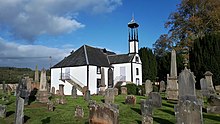John M'Millan
The training of his youth gave him a strong leaning to the side of the Cameronians, whose distinctive tenets were that no sworn allegiance was due to the king or government, on the ground that they had rescinded the Covenants and the Acts of the Reformation period.
Soon after his settlement he began to air certain grievances in the Presbytery, and to make protests against the form of church government, especially the Oath of Allegiance to Queen Anne, who was suspect on the subject of Presbyterianism.
Messrs Warner, of Balmaclellan; Telfer, of Rerwick; Cameron, of Kirkcudbright; Boyd, of Dalry; Ewart, of Kells; and Monteith, of Borgue, to answer it.
After the answer had been received and approved of by the Presbytery, the three ministers gave in a "protestation against all the corruptions, defections, errors, and mismanagements in the Church government of Scotland, as then established".
[10] Some farther proceedings having taken place respecting Mr Macmillan, the Presbytery records thus proceed: "All which being considered, and the presbytery being desirous to be as condescending as they can, for peace-sake, do pass all bygone differences and misbehaviours of said John Macmillan, declaring that if he behave not orderly for the future, but shall be turbulent and divisive, that then all former things now passed from shall be revived and he censured for them, with such new offences as shall be found just."
Mr M'Millan, still continuing in acts of insubordination, was served with a libel; but he declined the jurisdiction of the Presbytery" and appealed to the first free and lawfully constituted General Assembly of the Church."
At an early stage of his ministry he protested against "the corruptions, defections, and errors of the church government", and his relations with the presbytery grew more and more strained, until his brethren found themselves under the necessity of deposing him, 30 December 1703, for disorderly and schismatical practices.
The deposed clergyman still continued to perform all the duties of the ministry in the parish of Balmaghie, keeping possession of both church and manse.
The United Societies consistently refused to ordain him, no Presbytery having been constituted, and when he died, 10 December 1732, he had been a probationer for sixty-three years.
Notwithstanding this appointment, such was the spirit of the times and the powerlessness of the laws, that Mr Macmillan retained possession of the church, manse, and glebe, for about fifteen years after his deposition, though various attempts were made to remove him.
So much were the people of the parish incensed at the proceedings against their beloved minister, that they violently attacked Mr M'Kie, and treated him with much inhumanity, wounding his person and tearing his clothes.
Two years later, when M'Kie's friends went to plough the glebe for him, M'Millan's followers rose against them, as John Johnstone recorded in the Old Statistical account: "When some of Mr M'Kie's adherents went to plough the glebe for his behoof, those of his competitor rose up against them, cut the reins in pieces, turned the horses adrift, and threw the ploughshare into the adjoining lake.
It was remarked by the country people, that the intending assassin never prospered afterward, and that by her own hand she terminated a life which she felt herself unable to endure.
"[26] Constant appeals were made by M'Kie's adherents to the lord-justice clerk and solicitor-general, but the civil government manifested a disinclination to interfere, and the disorders continued in Balmaghie until M'Millan voluntarily resigned in 1715.
Their isolation originated in a movement of lay men and women who were dissatisfied with the Revolution settlement of Presbyterianism, at which the Covenants were ignored, and until 1706 they met only as fellowship "Societies".
To confirm the faith of members and give a public testimony of their principles, the covenants were solemnly renewed on Auchensaugh Hill in Lanarkshire in 1712.
Having finally thrown in his lot with the "Society people", M'Millan laboured among them with indefatigable zeal, traversing the country and gathering converts.
[32] Whereunon they together erected a 'Reformed Presbytery' at Braehead, Carnwath, 1 August 1743, and ordained new ministers, one of whom, John Cuthbertson, was despatched to support the cause in Pennsylvania.
[5] There was a Breach in the Reformed Presbytery in 1753 following the publication of the book A Treatise on Justifying Faith by James Fraser of Brea, who had written it while a prisoner on the Bass Rock and who had died in 1699.






